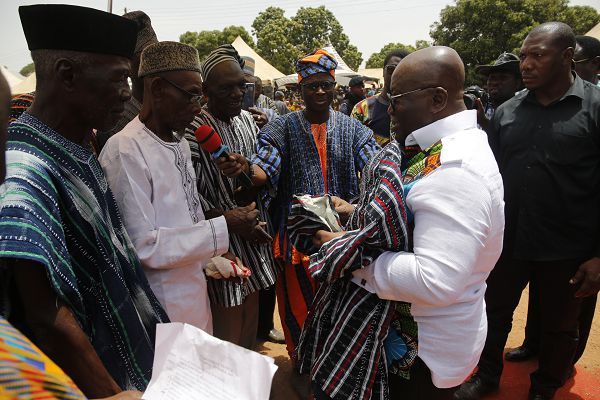
Akufo-Addo celebrates Paari Gbielle Festival with Sissala East people - Honoured with title, ‘Nandon-Tengeh’
The President, Nana Addo Dankwa Akufo-Addo, over the weekend joined the chiefs and the people of the Sissala East District to climax their annual Paari Gbielle Festival in Tumu.
‘Paari Gbielle’ in Sissala means ‘joyous celebration for farmers’.
This year’s celebration, the 10th edition, was on the theme: “Paari Gbielle Festival: A tool for the restoration of our cultural heritage”.
Honour
Nana Akufo-Addo is the first sitting President to join the people of Sissala to celebrate the Paari Gbielle Festival, and to show appreciation for his visit, the Paramount Chief of the Tumu Traditional Area, Kuoro Richard Babini Kanton VI, conferred on him the title: ‘Nandon-Tengeh’, meaning ‘A reliable friend’.
Thus the President now becomes known as Nandon-Tengeh Nana Addo Dankwa Akufo-Addo.
Also in attendance were traditional and opinion leaders, politicians, tourists, the clergy, among others, mainly from the five regions of the north and Burkina Faso.
Earlier in the week before the durbar to climax activities marking the festival, there had been prayers, clean-up exercises, health screening, sporting activities, indoor games and cultural activities.
Rich culture
The festival is used to thank God and the ancestors for a successful agricultural harvest and also offer prayers for a peaceful year.
The Sissala area, like all regions of the north, has one annual farming season which begins in May and ends in November.
The durbar to climax the week-long festival saw the various ethnic groups in the Sissala District, including Vaglas, Gonjas, Kasana, Wala and Lawra, displaying their rich and diverse cultures, with the smock or ‘fugu’ taking centre stage.
It was also an occasion for the chiefs and the people to showcase their rich culture, as depicted in their costumes, musical renditions and dances.
The warriors and hunters were not left out, as groups of them, mainly men, dressed in their hunting gear, sketched how they tracked and captured prey in the field, amid music and dance, to the admiration of the audience.
Transformation agenda
Addressing the durbar, President Akufo-Addo said the government’s transformation agenda was progressing steadily to improve the quality of life of Ghanaians.
“I have promised to redevelop the country and I am on course. Some traditional Jeremiahs who still doubt that my government can fulfill these promises should open their eyes and they will see that we are on course,” he said to cheers from the gathering.
Projects
On the Sissala East District, the President said since assuming office more than two years ago, his government had either initiated or completed a number of projects in the district.
Such projects included a two-storey, 12-unit classroom block at the Tumu Senior High Technical School (SHTS), a six-unit classroom block at the Kanton Senior High School and a one-storey, 320-capacity girls’ dormitory at the Tumu SHTS.
He said there were plans to construct another 320-capacity dormitory for boys at the Tumu SHTS, adding that he would ensure that the national cake was shared equitably to all.
President Akufo-Addo acknowledged that the Sissala East District was a bread basket and commended residents for their foresight in accepting the Planting for Food and Jobs programme.
He said the government had already dispatched 15 motorbikes to the district to facilitate the activities of agricultural extension agents, explaining that all the extension officers attached to the programme would be provided with the necessary logistics to enhance their output.
He said so far 65,060 cashew seedlings had been distributed to farmers in the area to improve on cashew production.
The President announced that the Sissala East District would benefit from the construction of 13 dams, in line with the government’s One Village, One Dam policy.
Lawra Traditional Area
The Paramount Chief of the Lawra Traditional Area, Naa Puowele Karbo III, who also addressed the durbar, expressed satisfaction for this year’s theme, which he explained was purposely chosen to draw attention to the fast erosion of the cultural heritage, with most of the youth not being able to speak their native languages and losing their traditional values.
Such developments, he said, needed to be checked, since they could lead to a situation where people could lose their identities.
“We should endeavour, during festivals such as this, to instill in our youth the virtues of hard work, honesty, truthfulness, respect for authority, among other positive cultural attributes, as the surest way to cultural restoration,” he said.
Needs
In his welcome address, the Paramount Chief of the Tumu Traditional Area, Kuoro Richard Babini Kanton VI, who is also the President of the Upper West Regional House of Chiefs, enumerated a number of social amenities and infrastructure that were needed to improve life in the area.
They included rehabilitating deplorable roads, particularly the Tumu-Leo highway, which also linked Ghana to neighbouring countries, which had been left untarred for years.
He also called for attention to be given to a dam in the area which was constructed in 1940 for it to be de-silted and rehabilitated.
Kuoro Kanton, who is also a member of the Council of State, commended the government for elevating the district to the status of a municipality.
He thanked the government for the introduction of various policies and programmes, such as the Planting for Food and Jobs, the free SHS policy, the One village, one dam and the One district, one factory policies, as part of efforts towards the attainment of the 17 Sustainable Development Goals (SDGs).
